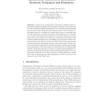407 search results - page 23 / 82 » Can search systems detect users' task difficulty |
ALMOB
2006
13 years 8 months ago
2006
The main goal of the motif finding problem is to detect novel, over-represented unknown signals in a set of sequences (e.g. transcription factor binding sites in a genome). The mo...
MM
2010
ACM
13 years 9 months ago
2010
ACM
TalkMiner is a search engine for lecture webcasts. Lecture videos are processed to recover a set of distinct slide images and OCR is used to generate a list of indexable terms fro...
EUSFLAT
2009
13 years 6 months ago
2009
The approach of continuous evaluation is an important tool in the learning process. However, only recently it was applied in training based on virtual reality. This paper presents ...
BMCBI
2006
13 years 8 months ago
2006
Background: Expressed sequence tag (EST) analyses provide a rapid and economical means to identify candidate genes that may be involved in a particular biological process. These E...
ECIR
2009
Springer
14 years 6 months ago
2009
Springer
Synchronous Collaborative Information Retrieval refers to systems that support multiple users searching together at the same time in order to satisfy a shared information need. To ...

